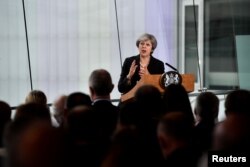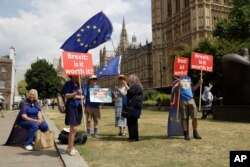Depending on who you talk to a second Brexit referendum is either the only way to break months of deadlock in Britain’s House of Commons or a beguiling idea that would worsen deep political divisions.
Either way, the odds are increasing on Britain holding a second plebiscite on whether it should remain in the European Union or exit, with or without a trade deal.
A survey published Sunday by the YouGov polling agency suggests that the 2016 referendum result would likely be overturned in a second plebiscite. In the survey 54 percent said they would vote to stay in the EU to 46 percent backing Brexit.
Thanks to a House of Commons unable to reach agreement on any specific form of Brexit, and a government equally at odds with itself, Britain is drifting towards crashing out of the bloc next March without any withdrawal or trade deal, a prospect that’s terrifying British businessmen.
Without a deal there would be no arrangements for air travel between Britain and the European continent, no agreement on the status of three-and-half million EU citizens living in Britain or a million-and-half Britons living in the EU. Production at major car and aircraft factories in Europe and Britain could grind to a halt because of disruption to supply chains; and financial services and the pharmaceuticals industry could be impacted gravely on both sides of the English Channel.
Last week, the European Commission said it is ramping up preparations to try to mitigate the impact on the Continent of a no-deal Brexit. Independent economists and analysts warn there would be as serious consequences for parts of Europe — notably Ireland, France, the Netherlands and Belgium — as the 2008 financial crash. The EC has issued warning notes to businesses outlining how to prepare for it.
The impact would be greater in Britain, which the International Monetary Fund estimates could see four percent shaved off economic output owing to trade disruption alone. Dominic Grieve, a former attorney general, told Sky News Sunday that “a no deal would be absolutely catastrophic.”
He added: “We will be in a state of emergency. Some basic services which we take for granted might not be available. It would not, for example, be possible for someone to fly to Rome because the over-flying rights over the other EU countries are regulated by EU law….And there would be difficulty in getting foods into this country because of the number of regulatory checks that would take place.”
The head of Amazon’s British subsidiary, Doug Gurr, told ministers at a summit Friday that his company was factoring in social unrest in its contingency planning in the event there’s no withdrawal agreement.
Britain’s beleaguered Prime Minister, Theresa May, has also started to put the country on a no-deal Brexit war footing. Starting this week, consumers and companies will be given detailed advice in regular “bundles” on how to prepare for “a disorderly Brexit.” The advice is likely to include the need to stockpile some foods and medicines. John Manzoni, a senior civil servant, told lawmakers last week: “Actually we don’t want this to happen but we have to prepare just in case it does.”
But some key players indeed do want it to happen. Hardline Brexiters in the Conservative party, estimated to number from 60 to 100 lawmakers, dismiss the doleful forecasts, arguing either they’re exaggerated, or, alternatively, they aren’t, but damage is the price Britain has to pay for a rebirth.
Boris Johnson, the former foreign minister who resigned earlier this month in protest at Prime Minister May’s latest plan to shape a “softer Brexit” with a free trade deal in goods with the EU, says the gloom is overblown. Johnson says May’s plan would see Britain having to abide by EU rules and European judges’ decisions and it would make Britain a vassal state by blocking free trade deals being negotiated with other non-EU countries, including the U.S.
That concern was fanned by U.S. President Donald Trump during his trip to Britain earlier this month. He warned a trade deal with the EU would imperil Britain being able to strike one with Washington. His former strategic adviser Steve Bannon, who says he still talks with aides in the White House, was in London last week encouraging the formation of a new hard right Brexit party.
Chequers Agreement
May’s plan, known as the Chequers Agreement, a reference to the Prime Minister’s country residence, Chequers, where it was unveiled, has so far prompted more than half-a-dozen ministerial resignations.
The deal, though, is all but dead. Amendments introduced by hardcore Brexit lawmakers have gutted it and EU officials have said in its present cherry-picking form it is unacceptable. The mood in Brussels hasn’t been improved by May’s new Brexit minister backtracking Sunday on some divorce terms agreed to months ago, saying now the British government will refuse to pay $52 billion to cover financial obligations London entered into before the Brexit referendum unless the EU strikes a free trade deal.
Hence the increasing calls for another referendum as the clock ticks and it becomes ever clearer there’s no Commons majority for either a no-deal Brexit or a so-called soft Brexit which would keep Britain still aligned with the EU.
The knot in many ways has been tightened by the Labor Party’s Jeremy Corbyn, the most far-left leader the party has had since the 1930s. At heart a Brexiter himself, he has left his party on the sidle-lines watching but not seriously exploiting the internecine war raging in Conservative ranks.
Retired top politicians, including Labor prime minister Tony Blair, have been calling for months for another plebiscite. They have now been joined by a growing chorus of currently serving politicians, including Justine Greening, a former Conservative education minister and a potential pro-Remain challenger to May, if a party leadership contest is triggered, which seems likely in the autumn. That in turn could prompt a snap general election.
Greening is the most high-profile serving Conservative lawmaker to endorse a second plebiscite. “The only solution is to take the final Brexit decision out of the hands of deadlocked politicians,” she says, by letting voters choose from three options:May’s now virtually dead offer, departure without any kind of deal or remaining in the EU.
Theresa May has adamantly ruled out another vote.
Former Conservative leader, William Hague, is also opposed to holding another vote. He fears revisiting the 2016 vote would enrage those who backed Brexit in the first place, adding to the toxicity of British politics.
And poison is flowing freely — especially in the very public battles raging in the House of Commons between Conservative Brexiters and Remainers. They have been hurling insults at each other with a disdain normally reserved for opponents in the Labor Party and other opposition factions.
Winston Churchill’s grandson and Conservative lawmaker Nicholas Soames has bemoaned the fratricide. “I don’t think in my 35 years as an MP that I have ever known such a truly unpleasant and deeply uncertain time in the House,” he said. Soames says he wishes Brexit would just be blown up.






